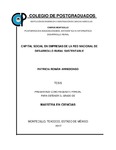| dc.contributor.author | Román Arredondo, Patricia | |
| dc.creator | ROMÁN ARREDONDO, PATRICIA; 658917 | |
| dc.date.accessioned | 2019-07-25T14:15:24Z | |
| dc.date.available | 2019-07-25T14:15:24Z | |
| dc.date.issued | 2017-07 | |
| dc.identifier.uri | http://hdl.handle.net/10521/3662 | |
| dc.description | Tesis (Maestría en Ciencias, especialista en Desarrollo Rural).- Colegio de Postgraduados, 2017. | es_MX |
| dc.description.abstract | Las empresas rurales son elementos de gran contribución para la solución de problemas en ese sector. La población rural ha desarrollado diversas iniciativas de base comunitaria para aprovechar sus limitados recursos y vincularse a diferentes niveles de estructuras y procesos en forma colectiva que de manera individual no le sería posible conseguirlo. El objetivo de esta investigación fue identificar el rol que juegan los elementos del capital social así como los beneficios materiales y no materiales que se derivan de este proceso en las empresas de la Red Nacional de Desarrollo Rural Sustentable (RENDRUS). Los datos se obtuvieron de una encuesta y entrevista abierta aplicada a 20 representantes de empresas RENDRUS participantes en la 21ª reunión nacional en el año 2016. Además se diseñaron y aplicaron a 57 representantes, dos Test: uno con escala tipo Likert para determinar el índice de capital social y el otro con pruebas proyectivas gráficas para identificar el proceso de cambio de los niveles de éxito de las empresas en el tiempo. Los resultados muestran que los elementos del capital social intervienen en el éxito de las empresas por que se basan en relaciones de confianza, respeto y ejercicio de normas y valores lo cual se manifiesta en, la buena comunicación, disposición de trabajo en equipo, apoyo mutuo, reciprocidad, solidaridad, consenso, responsabilidad, honestidad y transparencia. El efecto positivo del capital social en las empresas se manifestó a través de la obtención de beneficios materiales y no materiales. La escala Likert ratificó que existen altos índices de capital social en las empresas, lo que explica el éxito que actualmente tienen. La prueba proyectiva mostró que el éxito de las empresas, aunque han tenido una tendencia general creciente, esta no ha sido permanente y constante en el tiempo debido a diferentes problemáticas que han enfrentado y, en parte, gracias a su capital social, han logrado superarlas y ser exitosas. _______________ SOCIAL CAPITAL IN COMPANIES OF THE NATIONAL NETWORK OF SUSTAINABLE RURAL DEVELOPMENT. ABSTRACT: Rural enterprises are important contributors to solving problems in this sector. The rural population has developed various community-based initiatives to take advantage of their limited resources and to be linked to different levels of structures and processes in a collective way that individually could not be achieved. The objective of this research was to identify the role of social capital elements as well as the material and non-material benefits achieved from this process in the companies of the National Network of Sustainable Rural Development (RENDRUS). The data was obtained from a survey and open interview applied to 20 representatives of participating RENDRUS companies at the 21st national meeting in 2016. In addition, 57 representatives were selected and two tests were applied to them: one with a Likert scale to determine the index of social capital and the other with projective graphic tests to identify the process of changing the success levels of companies over time. The results show that the elements of social capital are involved in the success of companies because they are based on relationships of trust, respect and the exercise of norms and values which is manifested in good communication, teamwork, mutual support, reciprocity, solidarity, consensus, responsibility, honesty and transparency. The positive effect of social capital on companies was manifested through the acquisition of material and non-material benefits. The Likert scale confirmed that there are high levels of social capital in companies, which explains the success they currently have. The projective test showed that the success of the companies, although they have had an increasing general tendency, has not been permanent and constant in time due to different problems that they have faced and, thanks in part to their social capital, they have been able to surpass them and be successful. | es_MX |
| dc.description.sponsorship | Consejo Nacional de Ciencia y Tecnología (CONACyT). | es_MX |
| dc.format | pdf | es_MX |
| dc.language.iso | spa | es_MX |
| dc.rights.uri | http://creativecommons.org/licenses/by-nc-nd/4.0 | es_MX |
| dc.subject | Capital social | es_MX |
| dc.subject | Empresas rurales | es_MX |
| dc.subject | Éxito | es_MX |
| dc.subject | Social capital | es_MX |
| dc.subject | Rural entreprises | es_MX |
| dc.subject | Success | es_MX |
| dc.subject | Desarrollo Rural | es_MX |
| dc.subject | Maestría | es_MX |
| dc.subject.classification | CIENCIAS SOCIALES::CIENCIAS ECONÓMICAS::ECONOMÍA SECTORIAL::INVESTIGACIÓN Y DESARROLLO | es_MX |
| dc.title | Capital social en empresas de la Red Nacional de Desarrollo Rural Sustentable. | es_MX |
| dc.type | Tesis | es_MX |
| Tesis.contributor.advisor | Hernández Juárez, Martín | |
| Tesis.contributor.advisor | León Merino, Aurelio | |
| Tesis.contributor.advisor | Sangermán-Jarquín, Dora María de Jesús | |
| Tesis.date.submitted | 2017-07 | |
| Tesis.date.accesioned | 2017 | |
| Tesis.date.available | 2017 | |
| Tesis.format.mimetype | pdf | es_MX |
| Tesis.format.extent | 2,301 KB | es_MX |
| Tesis.subject.nal | Desarrollo sustentable | es_MX |
| Tesis.subject.nal | Sustainable development | es_MX |
| Tesis.subject.nal | Desarrollo Rural | es_MX |
| Tesis.subject.nal | Rural development | es_MX |
| Tesis.subject.nal | Capital social | es_MX |
| Tesis.subject.nal | Social capital | es_MX |
| Tesis.rights | Acceso abierto | es_MX |
| Articulos.subject.classification | Capital social | es_MX |
| dc.type.conacyt | masterThesis | es_MX |
| dc.identificator | 5||53||5312||531210 | es_MX |
| dc.contributor.director | HERNÁNDEZ JUÁREZ, MARTÍN; 393458 | |
| dc.audience | generalPublic | es_MX |


